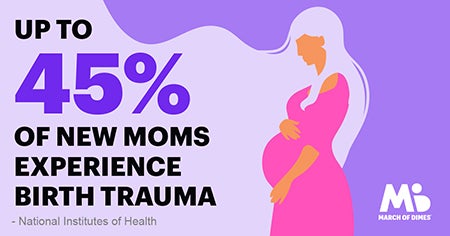Birth trauma is any physical or emotional distress you may experience during or after childbirth. During the birth, you may feel afraid, helpless or unsupported by those around you. After the birth, you may be left feeling guilty or numb due to events beyond your control. You could even suffer from panic attacks. If this happens, know that you’re not alone. According to the National Institutes of Health, up to 45% of new mothers experience birth trauma—and the effects can continue long after the birth itself.

Risk factors for birth trauma
There are many factors—both physical and emotional—that can contribute to birth trauma, including:
- A childbirth experience that was not what you hoped
- Birth complications, including a vaginal tear or too much bleeding
- Emergency C-section or the use of forceps or other medical devices
- You or your baby suffering a birth injury
- Your baby requiring medical attention after the birth
- Not receiving the care or support you expected from the hospital staff
Any negative meaning you associate with childbirth can stay with you for a long time. Unfortunately, many parents think they should ignore their feelings and present a happy face to the world. But it’s important to value your emotional health, recognize that your feelings matter, and give voice to your experience. This is the way you begin to heal.
The impact of birth trauma on your life
The myth persists that having a baby is supposed to be a natural, joyous event, so you might find it hard to come to terms with a childbirth experience that wasn’t what you expected. You might be ashamed of your feelings or even fearful of being judged, so you bury your emotions in the hope they’ll go away.
But unresolved trauma doesn’t simply go away. It’s important to examine your feelings to understand why you feel the way you do. Otherwise, these negative emotions can simmer under the surface, affecting your everyday life in big and small ways.

Recent research suggests that trauma can also be passed down through your DNA—affecting both your children and grandchildren. If you think you’re suffering from birth trauma, consult your doctor or seek counseling from a certified therapist.
Share your birth story as a way to heal
When you go through a traumatic birth, the emotional scars can stay with you forever. One of the best ways to heal from a frightening birth is to write your story, then share it with other parents—and hear their stories in return. And it’s not just difficult stories that help in the healing process. Positive birth stories are just as important in helping you overcome trauma.
Benefits of sharing your birth story:
- Helps you reframe your experience and give it new meaning
- Builds back your confidence to break the trauma’s hold
- Allows you to engage and connect with other parents
- Gives you back your identity and sense of self
How to write your birth story:
Download our birth story guide for tips on how to write your story in a way that is personal, honest and, most of all, healing.
How to write your share your birth story:
We’ve reserved a special section of our website where parents can connect with one another on important topics. This is a great place to share your birth story when and if you’re ready.
If you think you’re suffering from birth trauma, consult a doctor or therapist. Find additional postpartum resources and support here.
For frequently asked questions about birth trauma and other health issues, consult our FAQs page.
Reviewed March 2023
